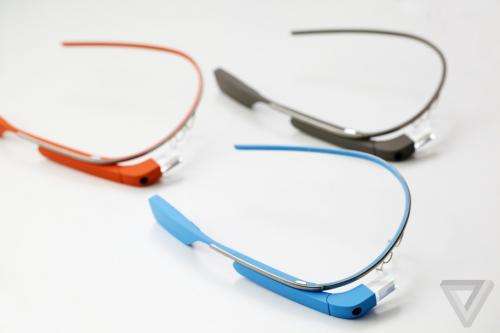August 18, 2013 weblog
Pay-per-gaze? Google patent proposes ad system

(Phys.org) —Advertising models could in the future expand from clicks to pupil dilations. Google's patent for a Gaze Tracking System became public last week. Originally filed in May 2011, the patent presents an idea for wearers of a head mounted device—and in 2013 observers are guessing this may be Google Glass—to have gaze tracked so that the system can pin down exactly what the user is looking at and even the emotional responses via pupil dilation. Information about where the user was gazing when viewing the external scene would be sent over to a server. Then the real work would start. An image recognition algorithm would be executed on the scene images to identify items within the external scenes viewed by the user. A gazing log tracking the identified items viewed by the user would be generated.
What's the benefit of translating images seen by the wearer of a head-mounted device into data logged on a server?
"To date," says the patent, "eye tracking systems have mostly been limited to research endeavors because of the intrusiveness, high cost, and reliability of these systems. A technique and system that can provide a reliable, low cost, and unobtrusive, eye tracking system could have a variety of useful everyday applications."
The usefulness is for Google and advertisers that flock to Google. Advertisers could be charged according to the number of views an ad received while wearing Glass, both offline and online. Google's patent refers to the process as "pay-per-gaze" advertising.
Of course, Google would not throw cereal boxes up on the screen each time a wearer tried to locate a restaurant, but instead would be setting up an advertising model of pay-per-gaze.
The patent discusses how this would work: "Under a pay per gaze advertising scheme, advertisers are charged based upon whether a user actually viewed their advertisement. Pay per gaze advertising need not be limited to on-line advertisements, but rather can be extended to conventional advertisement media including billboards, magazines, newspapers, and other forms of conventional print media." The system would involve "determining which, if any, of the identified items within the external scenes viewed by the user are advertisements; and charging advertisers associated with the advertisements based at least in part on a per gaze basis."
Needless to say, the patent's idea, if it were to fly on a device such as Google Glass, would unleash no small amount of conversation, from alarm, to spirited debate between privacy experts, industry marketing experts and Google. In anticipation of privacy concerns, the patent proactively faces the issues: anonymized data and opt-out privileges are two suggestions.
"To protect individual privacy, personal identifying data may be removed from the data and provided to the advertisers as anonymous analytics. In one embodiment, users may be given opt-in or opt-out privileges to control the type of data being gathered, when the data is being gathered, or how the gathered data may be used or with whom it may be shared."
The patent also suggests that individually identifying data be encrypted for communication between device and server system, to further protect privacy.
Debate at this stage, though, is premature. The patent, for one, filed in 2011, never mentions Google Glass, only with reference to a head-mounted gaze tracking device. Most important, this is a patent, not a product announcement. Patents at times do develop into real products and services but others do not. Time will tell if this patent evolves into advertising's new relationships with Google Glass.
More information:
Patent URL
marketingland.com/pay-per-gaze … g-google-glass-55714
© 2013 Phys.org





















